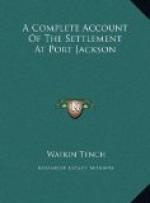Our fatigue to-day had been excessive; but our two sable companions seemed rather enlivened than exhausted by it. We had no sooner halted and given them something to eat than they began to play ten thousand tricks and gambols. They imitated the leaping of the kangaroo; sang, danced, poised the spear and met in mock encounter. But their principal source of merriment was again derived from our misfortunes, in tumbling amidst nettles, and sliding down precipices, which they mimicked with inimitable drollery. They had become, however, very urgent in their inquiries about the time of our return, and we pacified them as well as we could by saying it would be soon, but avoided naming how many days.
Their method of testifying dislike to any place is singular: they point to the spot they are upon, and all around it, crying ‘weeree, weeree’ (bad) and immediately after mention the name of any other place to which they are attached (Rose Hill or Sydney for instance), adding to it ’budyeree, budyeree’ (good). Nor was their preference in the present case the result of caprice, for they assigned very substantial reasons for such predilection: “At Rose Hill,” said they, “are potatoes, cabbages, pumpkins, turnips, fish and wine; here are nothing but rocks and water.” These comparisons constantly ended with the question of “Where’s Rose Hill? Where?” on which they would throw up their hands and utter a sound to denote distance, which it is impossible to convey an idea of upon paper.
Thursday, April 14th, 1791. We started early and reached the river in about two hours and a half. The intermediate country, except for the last half mile, was a continued bed of stones, which were in some places so thick and close together that they looked like a pavement formed by art. When we got off the stones, we came upon the coarse river sand beforementioned.
Here we began to trace upward. We had not proceeded far when we saw several canoes on the river. Our natives made us immediately lie down among the reeds, while they gave their countrymen the signal of approach. After much calling, finding that they did not come, we continued our progress until it was again interrupted by a creek, over which we threw a tree and passed upon it. While this was doing, a native, from his canoe, entered into conversation with us, and immediately after paddled to us with a frankness and confidence which surprised every one. He was a man of middle age, with an open cheerful countenance, marked with the small pox, and distinguished by a nose of uncommon magnitude and dignity. He seemed to be neither astonished or terrified at our appearance and number. Two stone hatchets, and two spears he took from his canoe, and presented to the governor, who in return for his courteous generosity, gave him two of our hatchets and some bread, which was new to him, for he knew not its use, but kept looking at it, until Colbee shewed him what to do, when he eat it without hesitation. We pursued




